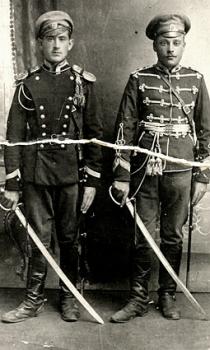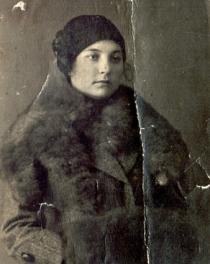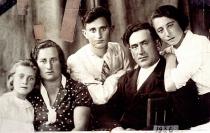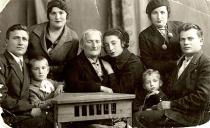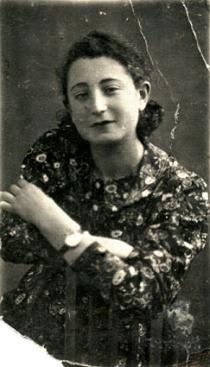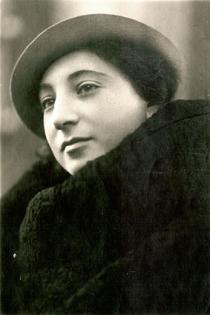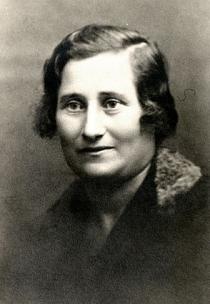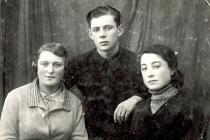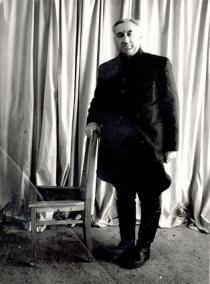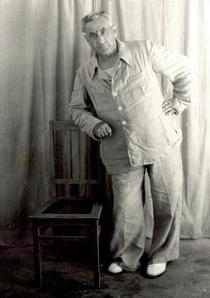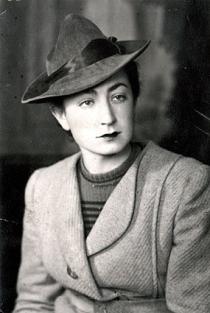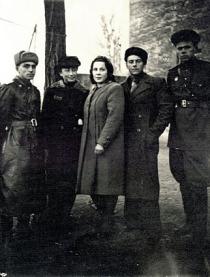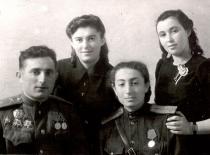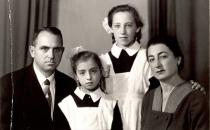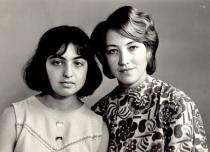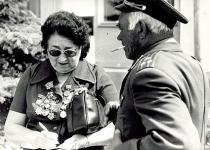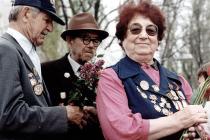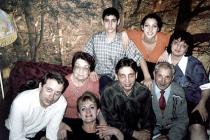
Asia Matveyuk
Kherson
Ukraine
Interviewer: Zhanna Litinskaya
Date of interview: September 2003
Asia Matveyuk lives in a standard one-bedroom apartment in a big 9-storied apartment building of the late 1970s in a residential district of Kherson. This apartment is clean and full of light. There are many handmade articles in the apartment: made from bird feathers, ivory, embroidered articles and dolls – all of them Asia’s works. She says she inherited this talent for handcrafts from her mother. Asia is slim for her age. She wears a jeans dress, has colored and nicely done hair, manicure, and she looks young for her age. Before the interview Asia shows me a number of albums with greeting cards from her frontline friends from different towns and countries. She tells me that in the article dedicated to her military past she was called a ‘girl from a legend’. When telling her story she changes and I can really see a young girl in her.
My family came from the south of Russia where in the Azov region, in Kherson and Nikolaev steppes [present southeastern Ukraine, about 500 km from Kiev] during the rule of Catherine the Great 1 settlements of the minorities, so-called colonies were established on rich fertile lands. In the middle of the 18th century the tsarist government of Russia sent Polish, Greek and German minority groups to populate the areas that previously belonged to the cossacks 2, who were actually exterminated. Later, in the middle of the 19th century, they deported Jews to this area. They took to farming. My paternal and maternal relatives lived in one of such colonies in Novopoltavka Nikolaev region where the Jewish population was prevailing, but there were also Ukrainian and German residents. Jews mostly dealt in farming, but they didn’t forget about traditional Jewish occupation in crafts. There were tailors, shoemakers, glasscutters and carpenters in our colony providing their services to the population of the town. This colony was actually a big village consisting of a German, the largest Jewish and Ukrainian parts. The Jewish sector was in the central part of the village. There was a synagogue in the Jewish neighborhood and there were churches in the German and Ukrainian parts. Jewish colonists tried to educate their children. Boys attended cheder until they turned 13. They received traditional Jewish education. There was also a Ukrainian school in the colony. During the Soviet period Jewish children moved to bigger towns where they could get a higher education.
I remember my paternal great grandfather, my grandmother Zisel’s father. His surname was Grinker, but I’ve forgotten his first name, unfortunately. My great grandfather was born in 1829 some place in Vinnitsa region [250 km from Kiev] and his family moved to the colony when he was just a boy. He was not tall, stout and had strong heavy fists. I knew him when he was a 100-year old man. He used to visit us on his way to or from the synagogue. He had a glass of wine groaning with pleasure; my father’s wine was the best in the village and my great grandfather was quite an expert being a farmer and winemaker like the majority of residents of Novopoltavka. My great grandfather always wore a cap, even sitting at table, and had his religious accessories in his bag: tallit, tefillin and books of prayers. My great grandfather was never ill and lived to the age of 105. He would have lived longer if it hadn’t been for the famine 3 in Ukraine in the early 1930s that destroyed his really athletic health. He died in 1934.
My great grandfather had many children, but I only know the family of my father mother Zisel’s older sister living in Nikolaev, but I don’t know her name or anything about her life. Grandmother Zisel, born in the 1870s, had no education and was a housewife that was customary for Jewish families. Zisel married Zelman Leikind, my grandfather, a Jewish man from the colony who was a little older than my grandmother. Zelman who was called ‘Alter’ (‘old, wise’ in Yiddish) in the village was a shoemaker, and he was a very poor shoemaker. He worked at home and I remember everything in my grandparents’ home smelling of glue and paints. There were two or three rooms in their house with wooden floors, and a kitchen with the ground floor. Before Jewish holidays my grandmother thoroughly washed this floor and applied light clay onto it. There were two stoves in the house: one heating the rooms, they started fire with straw and then added wood, and a Russian stove 4, that occupied probably one third of the kitchen. My grandmother cooked and kept food for Sabbath in it. The food was kept warm until Saturday. I spent my childhood years in my grandmother’s home and have vague childish memories about their life, therefore. However, I remember well that my grandfather Zelman always wore a kippah, and put on a cap or a straw hat to go out. Grandmother Zisel always had a kerchief covering her head. The family was poor, but they always baked fresh challah bread and made delicious dinner for Sabbath. Grandmother lit candles and the family celebrated Saturday. They also celebrated all Jewish holidays. I remember that my grandmother washed and boiled her utensils and crockery in a big basin: she didn’t have special crockery for Pesach. They bought matzah at the synagogue and had all required food on the table: bitter greeneries, potatoes, eggs, chicken leg, etc. Besides, there was sure to be gefilte fish and sweet pastries. My grandmother always baked little ‘Haman ear-shaped’ pies: hamantashen. They also celebrated Chanukkah and had doughnuts with jam made for it and lit candles in the chanukkiyah every day of eight days. Unfortunately, I have fragmentary memories about Jewish traditions in my grandmother’s home since later my father, who was a village activist and communist, forbade me to attend religious holidays.
My father Shoilik Leikind was the oldest of the children. The next after him was Arkadiy, born in 1900. Arkadiy perished during the Civil War 5 – Makhno bandits 6 killed him during a pogrom 7. At that time 120 people perished in Novopoltavka. They were buried in a common grave and later a monument was installed on the grave. People called this grave ‘120’.
My father’s sister Freida was about 4 years younger than my father. Freida was married to Yosif Minot, a local Jew. He was a loader. Freida and Yosif had two sons: Arkadiy, named after his uncle and another son whose name I don’t remember. Freida, Yosif and their younger son who was to turn 16 in the first year of the Great Patriotic War 8 perished along with other Jews of Novopoltavka. Fascists killed them. Their older son Arkadiy was taken to the army and this saved his life. He was at the front and was wounded. After the war he married Sopha, a Jewish girl, and they moved to Nikolaev. They didn’t have children. He still lives there.
My father Shoilik Leikind, born in 1898, studied in cheder. Then he finished three or four grades of a Jewish school. Like many other residents of Novopoltavka he took to farming and winemaking. They said my father was very strong and so was Arkadiy. They used to haul a wagon full of grain to the mill. In 1915 my father and his friend Solomon Levi were taken to the czarist army. They were to serve in cavalry and my father’s horse was also assigned to the army. During World War I my father was wounded in his shoulder. He returned a different person from the war: like many other representatives of poor Jewish families he got fond of revolutionary ideas and dreams about a better life and construction of a communist society. I cannot say what particularly had this effect on my father: it might have been the communist propaganda thrust on soldiers. My father stopped going to the synagogue, joined Komsomol 9, and became the leader of the village poor.
My father was also thinking of marriage. He knew my mother since childhood and before going to the czarist army he got her acceptance of his proposal to get married. However, their parents didn’t give their consent to this marriage. My mother was not the oldest daughter in the family and had to wait until her older sister got married.
My mother’s father Solomon Levit, born in the 1870s, was a farmer. I hardly know anything about my grandmother Zelda. I didn’t know her. She died of cholera in 1921. Since them my grandfather Solomon lived in one of his children’s families. My grandfather was religious. He went to the synagogue in Novopoltavka every day, observed the fast, prayed every day and celebrated Jewish holidays. He moved to Lugansk [650 km from Kiev] with his daughters and living there he also tried to observe kashrut and celebrate Saturday.
Besides my mother, there were 6 daughters and one son in the family. The oldest was my mother’s brother Abram Levit, born in 1895. He also grew grain and grapes. He married Etl, a Jewish girl from the neighboring town of Novy Bug. The first babies in the family were two boys: Tulia and Ruvim, and there was another boy, whose name I don’t remember. In the late 1920s two twin girls were born. Only one of them grew to her adulthood. Her name was Anna. Another girl died in an accident when she was a baby. Father Etl was smoking near the baby and dropped ash onto the baby’s diapers. When he understood what happened and rushed to put down the flames the baby got burnt and died. It was a terrible trauma for Abram and his wife, but father Etl suffered most of all. Two years later the family moved to Moscow escaping from famine. Father Etl was a breadwinner of the family at first: he worked as a janitor and was selling some little things until Abram got a job at a plant. During the Great Patriotic War Abram served in the Territorial Army [editor’s note: People’s volunteer corps during World War II; its soldiers patrolled towns, dug trenches and kept an eye on buildings during night bombing raids. Students often volunteered for these fighting battalions] near Moscow and Abram’s sons were at the front, but the rest of the family stayed in Moscow. Only Ruvim survived in the war. He lives in Moscow now. Anna died in a tram accident in the early 1950s. Abram and Etl died in Moscow in the 1990s and were buried in a town cemetery, on the Jewish part.
The next child in my mother’s family was her older sister Rokhel-Leika, born in 1896. She was ugly and squint-eyed and nobody wanted to marry her and this delayed my mother’s marriage. My father convinced his distant maternal relative Abram Grinker, who was a shoemaker, to propose a marriage to Rokhel-Leika, who was going to have a sufficient dowry. They got married and their marriage worked well, but regretfully, it didn’t last long. Rokhel-Leika died of cancer in the late 1920s. They had two daughters. Abram remarried. His second wife also had two children. Abram died in Kirov [today Russia] where he and his daughter Zelda were in evacuation during the Great Patriotic War. His second daughter died during a bombing raid on the way to Kirov. Zelda married a Russian man. She lives in Lvov. We hardly ever communicate. We only occasionally greet each other on holidays.
The rest of my mother’s sisters were younger than her. In 1900 Maria was born, then came Feiga, born in 1903, then Etah (she was called Katia for some reason) was born, and in 1910 Zisl (called Zhenia in the family). Maria and Feiga married Jewish brothers Sakhnins from Novy Bug. Grigoriy, an older brother, married Maria, and Leonid, the younger one, married Feiga. They lived in Novopoltavka before 1932. When famine began in 1932, they went to work in the mines and settled down in Lugansk. In 1933 Zisl married her sisters’ friend, Grisha Lein from Lugansk, and moved to Lugansk like her sisters. Etah married Yosif Berman,. A Jewish man from Novopoltavka, and they also moved to Lugansk. All my aunts had traditional weddings, but I only remember Etah and Yosif’s wedding. The bride and bridegroom were taken to the synagogue separately and I was amazed that the bride was crying. Somebody explained to me that it was a ritual. The bride and bridegroom were standing under a chuppah at the synagogue where a marriage contract was executed. Then there was a party with wine and sweet dishes on the table. On the second day the party continued, and there was gefilte fish, meat and chicken on the table. Everybody enjoyed the party and it was a lot of fun. We, children, danced in a common circle. After the wedding Etah and Yosif registered their marriage in the registry office. I think my other aunts’ weddings were alike. My aunts and their families lived in Lugansk until the beginning of the Great Patriotic War. Maria, Feiga and Etah worked in a printing house, and Zisl became a hairdresser. Maria had three children: Rosa, Arkadiy and another son, whose name I don’t remember. Feiga had two children: Raya and another girl, Etah had daughter Maya, born shortly before the war, and Zisl had son Pavlik, born in 1937, and a girl, born in 1940. During the Great Patriotic War my mother sisters’ husbands were at the front. Leonid perished during the defense of Kiev, and Etah’s husband Yosif also perished. Grigoriy Sakhnin and Grigoriy Lein became invalids during the war. They died in the 1950s. The sisters were in evacuation in Karaganda [today Kazakhstan] and then in Tashkent [today Uzbekistan]. Maria’s son didn’t return from the war, and Zisl and Feiga’s daughters died in evacuation. Maria and her children Rosa and Arkadiy emigrated to Israel in the 1970s where Maria died at the age of 95. Maya lives in Lugansk now. She finished a college after the war and worked as a teacher till she retired. She was single. Etah died in the 1980s, and Feiga died in the 1990s. Zisl died in the early 1960s. She never recovered after her son Pavlik died tragically. Pavlik perished in 1954, during a training flight in an aviation military school.
My mother Ethel Levit was born in 1898. She was raised religious and studied at home with a melamed. She also finished three years in a Jewish school. My mother’s family was wealthier than my father’s. Her father bought her a Singer sewing machine, and my mother learned to sew well. She was born a beauty and had a talent of modeling and making beautiful outfits. She was a success with her clients. In due time my mother began to make clothes for Nikolaev actors. She made special and unique clothes. She went to Nikolaev for a few weeks to do her job once in three-four months.
My parents got married in 1918, shortly after Rokhel-Leika’s wedding. Although my father wasn’t religious any longer and spoke against any religious traditions, to be able to marry his beloved girl he had to observe all Jewish religious wedding traditions. They had a chuppah at the synagogue according to the rules. However, there was no big wedding party since it was a hard period of life shortly after the revolution 10, the power shuffled from one group to another resulting in destitution, pogroms and hunger.
I was born in March 1919. I was named Asia for the first letter in my name was the same as in the name of my father’s brother Arkadiy who had perished during a pogrom. Two years later my younger brother Tulia was born. In 1924 my mother got pregnant again, but she had an abortion made in the Red Cross hospital in Nikolaev. The abortion didn’t go well and my mother got some infection. She was brought home severely ill and having a brain inflammation. I remember her crying of pain, and everybody around crying of sympathy and sorrow. This happened in January 1924. I remember somebody baking a few apples for my mother. Our neighbor brought them. I remember how I burst into tears because they gave those apples to my mother and I didn’t quite understand what was going on around. My mother was taken to a hospital in Nikolaev where she died. My father gave some money to an attendant in the morgue to take my mother away from there without autopsy that was not allowed by Jewish laws. Our relatives blamed my father that he allowed my mother to have this abortion forbidden by the Jewish religion. Grandfather Solomon didn’t even want to talk to my father for many years. My brother and I stayed with my paternal grandfather and grandmother during the funeral. All I know is that my mother died approximately at the same time as Lenin 11, and there were no funerals allowed due to the mourning period after Lenin. My family had to wait a few days to bury my mother’s body.
My brother and I lived with grandmother Zisel and grandfather Zelman for a whole year. They were very kind people and loved us a lot. I liked Friday most of all, when my grandmother prepared the house for Sabbath washing and polishing the floors, covering the tables with clean tablecloths, and we were washed and dressed up. On Saturday my grandmother and grandfather went to the synagogue and took me with them. The synagogue was big and beautiful and seemed like a palace to me. I was sitting with my grandmother on the gallery of the second floor with all other women and watching around. My father didn’t like it that my grandmother took me to the synagogue and often argued with her. A year later my father married my grandmother’s niece Freida. Her father Ruvim Grinker was grandmother Zisel’s stepbrother. Freida’s first husband Abram Girshel’ died. She had a son named Samuel. He was the same age with me. My father and Freida registered their marriage in 1925. They didn’t have a Jewish wedding. We moved in with Freida with our father. Freida’s father Ruvim was a tailor and earned well. Freida’s mother Mindel was a very kind and nice woman. Freida had two brothers: Boris and his wife Ida and Mendel and his wife Khasia. I only saw them once, when we went to be photographed in Nikolaev. The brothers perished during the Great Patriotic War. I have no more information about their wives. The big stone house had five rooms and a big kitchen. Later they leased a part of the house and we stayed in two rooms. There was no electricity and food was cooked in a Russian stove.
In 1927 Freida gave birth to a girl named Braina after Freida’s deceased mother. Freida was a kind and nice woman and never distinguished between her own children and her stepchildren and I began to call her ‘mama’. Freida was raised in a religious family, but my father forbade her to observe Jewish traditions or celebrate holidays. He became particularly strict about it after he became a communist in 1927. There was no celebration of Sabbath in our family, and I used to run to grandmother Zisel’s secretly to meet Saturday. If my father got to know about it, there was sure to be a scandal with me, Freida and grandmother. Once my father was almost expelled from the party because my grandmother and grandfather attended the synagogue. He ordered them to stop doing that, but my grandmother continued lighting candles on Friday and praying, though authorities declared a ruthless war to any religion 12. In the early 1930s this issue was resolved. The synagogue was closed and the building housed a 10-year school.
I went to the Jewish 7-year school in 1926. Actually, it was a merge of the Jewish and Ukrainian 7-year schools: we had many common classes since there were not so many children in the town and Ukrainian and Jewish children spoke two languages fluently. We spoke Yiddish at home and Ukrainian and Yiddish to our friends. There was no anti-Semitism. We liked strolling in the Jewish, Ukrainian and German parts of our village. I had Jewish, Ukrainian and German friends. My friend Martha taught me German. I became a pioneer and then joined Komsomol at school. We liked parades on Soviet holidays. There were parties and meetings at school. We celebrated 7 November 13 and 1 May at home.
In the early 1930s collectivization 14 took place in our village under my father’s supervision. There was a Jewish kolkhoz 15 established. It was named ‘120’ after 120 Jews who perished during the Civil War. My father became chairman of the village council. People liked my father and called him with the Russian name of Sasha converted from his Jewish name of Shoilik. My father was a charming, handsome and very strong man. There were strolling circus wrestlers at the time traveling from one town to another and when they came to Novopoltavka, the villagers asked my father to wrestle with them. I remember a famous wrestler, huge, with his boots unpicked in the seams on his fat legs, came to the village. My father looked thin and short compared to him. My father grabbed him by his belt and threw him to the ground. The wrestler rose to his feet and shook my father’s hand acknowledging his victory. Then some circus representatives came trying to convince my father to become a professional wrestler, but Freida was whining begging my father to refuse and never again take part in wrestling.
In the early 1930s an accident happened. My brother Tulia was a very advanced boy for his age. He was even a genius. He solved mathematic problems for senior boys and old men were even saying that a boy with such talents hardly had many years of life ahead of him. There was this prejudice in the old times. Tulia, besides his passion to sciences, had another passion: horses. Tulia adored horseback riding. In August 1931 during harvesting Tulia and his friend were helping my father hauling grain to the elevator. Tulia gave the reigns to his friend who failed and the horses dashed off. They were crossing a bridge and Tulia fell from the wagon and hit his temple. My father drove him to the hospital, but my brother died in his arms on the way there.
My father couldn’t recover for a long time. Then another accident happened to our family. In 1932 authorities were taking away grains from farmers and denouncing the kulaks 16. My father was kind to people and couldn’t take away what they had earned working so hard. One summer night in 1932 NKVD 17 officer came for him. They turned the house upside down: there was a search and they found a bag of grain that they had put there themselves. My father was arrested and taken to prison in Nikolaev. 36 people were arrested in Novopoltavka then. My father was charged of sabotage and wreckage of the plan of state grain procurement plan and he was to be sentenced to a long-term imprisonment. In autumn the famine broke out. People were swollen from hunger and were dying in the streets. We were also starving: my great grandfather, grandmother Zisel’s father, and my grandmother Zelman starved to death. We were picking herbs and spikes in the field and my mother made some kind of flat cookies from them. My father got some bread in prison. He dried it and sent us a bag of dried bread from prison. My father was imprisoned for almost a year and a half. Mother Freida, a common Jewish woman, realized that she had to rescue him. She took whatever miserable savings she had and went to Kharkov that was the capital of Ukraine at the time. She was away for almost a month. She told us that she had an appointment in the Party Central Committee. I don’t know whether it was for this reason or because Yezhov 18 was appointed Minister of the state security, my father’s case was reviewed and he was released. He resumed all his rights and his Party membership. He became chairman of the village council again.
He returned in spring 1934. In summer I finished school and my parents sent me to my mother’s sisters in Lugansk to continue my education. I was drawn to medicine since childhood and I could watch pharmacists making medications in the pharmacy across the street from our house for hours. I entered a Medical School in Lugansk. I lived in a hostel. My aunts’ husbands, particularly, the Sakhnin men, were very mean and didn’t allow my aunts to support me. I tried to visit my aunts when their husbands were away from home. I often visited aunt Maria with whom grandfather Solomon lived. My grandfather saved some change to my visits: he saved the change when they sent him to buy bread and gave this money to me in secret in the hallway so that nobody saw him. Aunt Zisl also came to see me bringing something to eat. My aunt Etah supported me most of all. However, regardless of this help or a meal with my relatives once a week I was starving and got very thin by the summer of 1935 and fell ill. At that time I was having training in Debaltsevo, a miners’ town. There was an accident in a mine and seeing many dead bodies and blood I had a nervous breakdown. My father came there and took me back to Novopoltavka.
The famine was over and life was improving in our village. The people were joyful and the village looked revived. There was a new club building constructed in the center of the village where young people from the whole colony got together in the evening to dance and socialize. Many young people from our colony were studying in colleges in Odessa, Nikolaev and Kherson. They came to the village on vacation that summer. We danced, listened to the radio and watched movies. I spent in Novopoltavka almost a whole year till my health condition improved. When I returned to Lugansk, I went to study at the Pharmaceutical Faculty remembering my hobby when a child. Of all children, only Braina was at home. Freida’s son Samuel was recruited to the army.
After finishing my school I got a job assignment 19 to Nikolaev. I left Lugansk and never saw my grandfather Solomon again. In 1940 he left home and got lost. He had severe old age sclerosis. He was never found. Most likely he died somewhere on the road.
I went to work as a pharmacist and also worked part-as an attendant in the hospital to earn more money. I lived with my distant relatives on my grandmother’s side. I dwelled behind a curtain in the kitchen and was dreaming of getting a room of my own. To stay away from this corner I often worked night shifts in the pharmacy and studied. In 1939 I entered the extramural department of Pharmaceutical College and became subject to military service like all other medical employees. I had exams twice a year and received all excellent marks for my studies. Here in Nikolaev I met my first love Mikhail Kantor, a Jew. He studied in the Shipbuilding College. We met, went for walks in the town and visited my family in Novopoltavka dreaming about our future. In 1939 I was appointed director of the pharmacy in Peresadovka village of Nikolaev region. I rented a room from a local Jewish family. In summer 1940 Mikhail finished his college and got a job assignment to a military shipbuilding plant in the Far East in Vladivostok, in 7000 km from home. He proposed to me. When I told my father about it he forbade me to get married. He said I had to finish my college first. I couldn’t argue with my father. I understood that he was right. Mikhail left for his work and wrote letters full of love to me. In 1940 I was mobilized to the army during the Finnish War 20. We received uniforms: sheepskin jackets and valenki [warm Russian felt boots] and went to Leningrad by train. When we arrived it was announced that the war was over. It lasted 6 months. We gave back our uniforms and returned home.
In April 1941 Mikhail came on vacation. He brought me a luxurious wedding gown and we began to prepare to the wedding. Peresadovka was not far from Novopoltavka. I often went home and Mikhail came to see me there. Our wedding was appointed for 22 June 1941. We were to have a civil ceremony and go to my family in Novopoltavka where everything was ready for the wedding. On 22 June we heard that the Great Patriotic War began. I went to my father in Novopoltavka immediately. My Dad again forbade me to get married. He thought that this war was going to be no longer than the Finnish campaign and said it was not convenient time for getting married and that I had to wait until the war was over, particularly that there was not much of waiting whatsoever: no longer than 6 months. And I missed my love for the second time. Mikhail left. I packed my wedding gown into a box and returned to Peresadovka.
I went on working. I received lots of medications in the pharmacy department. My father volunteered to the army in early July 1941. On 7 August retreating Red army troops were moving through Peresadovka. I was enlisted into a field engineering brigade. I came to Nikolaev with this brigade. I submitted the poisons and cash, about three thousand rubles that I had to the pharmacy department. They accepted the cash and disposed of the poisons in the toilet. From this day of 7 August 1941 my army service began. I didn’t have time to say good bye to my grandmother Zisel, mother Freida and sister Braina.
In this engineering brigade I was chief of the so-called sanitary unit consisting of me, a sanitary bag, a gas mask, a small-caliber rifle and a sanitary cart. I also acted as a pharmacy supervisor. We were retreating and somewhere near Krivoy Rog Germans actually exterminated our field engineering brigade. The remaining part of the brigade with slightly and severely wounded soldiers was retreating across the burning steppe. We covered about 70 km from Pervomaysk to Dnepropetrovsk hiding from the enemy’s aircraft in the fields of wheat. We often found burnt bodies after air raids. Where did this fear that I felt at the mine disappear? I dragged the wounded, applied bandages and helped them as much as I could. So we reached Dnepropetrovsk where the sanitary department of the 4th Ukrainian Front was located. I was burnt when I came to Dnepropetrovsk: even my skin was peeling off my face. We were sent to take the wounded into a sanitary train heading to Pavlograd. As soon as we loaded them in the train it was bombed down. We went to make rafts for the wounded on the Dnieper and the enemy’s aircraft were firing at us. God was just guarding me. I was sent to Lugansk from Dnepropetrovsk. My aunts were still in Lugansk. They were to evacuate. I helped them to board a train taking advantage of my officer’s status. I was appointed chief of the chemical department of the pharmacy headquarters. It evacuated to Kuibyshev [present Samara, Russia, 1400 km from Kiev]. Sanitary headquarters of the Red Army was in Kuibyshev.
Some time in late September 1941 we arrived in Kuibyshev. Chief of the sanitary headquarters offered me to enter the Medical Academy in Kuibyshev, but, being raised as a patriot, I was eager to go to the front. I knew that my division was in the process of remanning in Novosibirsk and I managed to obtain permission to go there. This process of remanning of our Red Banner Division #235 lasted from November 1941 till March 1942. On my birthday on 20 March 1942 we moved on to the North-Western front by train. Our division deployed near Kulotino village holding defense from an SS division. We were there about 10 months and there was combat action through this whole period. I served in the sanitary unit and was chief of the pharmacy of the regiment. I slept in an earth hut, under one overcoat with Anechka Shulginova. I was young, slim and even pretty. Few times I received unequivocal proposals from officers to share their bed and become their combat girlfriend, as it was called then, but I took an oath to preserve my virginity and youth for Mikhail. They backed off gradually, but they treated me with respect and care and called me a ‘fiancée’. Only one sergeant said with an ironical smile once: ‘Don’t touch Asia, she is keeping herself safe for Abram’ [Jewish names were targets of mockery, vulgar jokes and often exclusion at the time], and I slept him on the face instantly. This was the only demonstration of anti-Semitism that I faced. I need to mention here that this guy got a good telling off from other officers and never offended me again.
I corresponded with my father. He was commanding officer of a mine firing company and was severely wounded in combat action near Stalingrad [present Volgograd, today Russia]. He had gangrene of his leg, but his doctors managed to save his leg. My father spent in hospital six months and then he left for Begovat town in Tashkent region where many residents of Novopoltavka were in evacuation. Mikhail found me via my father and we began to correspond. He wrote me about his love and our wonderful future and begged me to take care of myself. Mikhail was a military representative at his shipyard. He was a very good specialist and they didn’t let him go to the front. My father sent me his photograph in the hospital.
We had sufficient food at the front. It was plain food: a bowl of soup and boiled cereals, but there was enough of it in a meal. Before combat actions soldiers received 100 grams of vodka and every day in winter for keeping warm.
We shared duties at the front: I went with assistant doctors and sanitary attendants to pick the wounded at the front line. Our regiment got an important task to capture a prisoner for interrogation. The regiment often went to get combat intelligence and my task was to prepare everything necessary for 400 wounded. I loaded everything necessary on a horseback and rode the horse to haul the load to its destination. I mobilized a field hospital and received the wounded, cleaned their wounds and applied bandages and sometimes I closed their eyes and heard their final sighs.
I was elected secretary of the Komsomol unit of the company. I was preparing to join the Party and got a Party task: I became an agitator for German troops. Here I could make a good use of those German lessons that my friend Martha gave me. I was in a vehicle with a loudspeaker where I was reading my announcements in German calling soldiers to drop their weapons and voluntarily come to our side. I spoke about their wives and children waiting for them in Germany. However, I did not usually manage to pronounce this part of my speech: there was a squall of firing falling onto the vehicle and I had to retreat. Once I was too late to retreat and a stray bullet wounded my leg. I had this bullet removed and my wound bandaged and continued my performance on my combat post. When our interpreter perished I took up his functions. Once our intelligence group managed to capture a prisoner for interrogation. They were dragging him in the snow for several hours and his legs were frost bitten that resulted in the gangrene. This German was big and strong and he didn’t allow anybody to approach him, and there was no question of interrogating him, but saving his life to be able to get some information from him. My fellow comrades addressed me: ‘Asia, only you can help!’ I came to the earth hut where the prisoner was. He was surprised to see me: a girl, lieutenant! His legs were black already. I sat beside him and started talking: that I liked Germans, that they were wonderful and cultured people, that they were not to blame and that soon Hitler would be done with. This German screamed: ‘Nein kaputt!’ I talked to him for a long time asking about his wife and children. He finally allowed me to treat his wounds, I made an injection of morphine and he calmed down and kissed my hand. I managed to get valuable information from him necessary for our further advance. Then the German was taken away, my headquarters sent a truck to drive me to the office where I reported what this German told me. They praised and greeted me on my success and made an entry in my officer’s record book about an award ‘For valor!’
The conditions in our area of the frontline were very bad. It happened so that soldiers didn’t get washed through a whole winter being in trenches all the time. One of our routinely tasks was fighting lice. Ania and I went to examine our soldiers in trenches. We took soldiers’ overcoats and underwear throwing them into the snow: it became black with lice. We shook them out till they were clean. We treated soldiers with special soap. Once in late November 1942 Ania and I were busy with our inspection. At that time General Gorokhov, member of the Military Council arrived to do inspection and saw us shaking out the overcoats. I reported to him according to the procedure: how many patients we had and how many were sent to hospital. I told him my name and military rank. He asked me more questions and when he heard that I had been taken to the front from the second year of Pharmaceutical College, he got angry: ‘We need specialists, and she is fighting lice here’. He said this in a joking manner, but he was angry. A month later I was sent to the 28th Guard Division that had recently escaped from encirclement. Chief of medical logistics of the division had perished and I replaced him. This was a major’s position and I was promoted to senior lieutenant.
I went across Ukraine with this division. We liberated a number of towns in the south and east, Moldavia, Poland, Romania and Bulgaria. Our unit was a rear unit of the frontline following the regiment. We got under firing and bombings, but the Lord guarded me. I might have perished many times, and I remained safe just by chance. I remember one incident. I was going to the medical unit to get medications and, as usual, there were a few wounded put into my cart. Once I was riding holding the head of a severely wounded soldier, when another air raid began. Somebody screamed calling for me and I rushed from where I heard the call. When I returned, there was no cart or my wounded patient: a bomb had hit my cart.
In early March 1943 our division liberated Krivoy Rog. There was to be a big concert on 8 March, International Women’s Day, and I, being a member of the Party, was to speak in front of our women to raise their spirits telling them about our victories and the nearing victory over fascism. But the most important event that I was looking forward to, was award of a medal ‘For valor’ [Established October 17, 1938. The medal was awarded for personal courage and valor in the defense of the Homeland and the execution of military duty involving a risk to life]. The meeting had just started, when all medical staff was urgently called to leave. It turned out that our officers decided to celebrate 8 March with our laundry girls and drank liquor from the container with the inscription ‘Alcohol’ on it that Germans had left behind. It turned out that it contained waste braking fluid. They were delivered to the sanitary unit for severe poisoning. We kept fighting to save their lives, but they all died except one girl, who drank a little. Regretfully, there were many such cases during the war: fascists used to leave food and alcohol on tables, and our soldiers and officers couldn’t resist the temptation to eat and drink, though there were numerous warnings against it. There were many deaths caused by poisoning, and they were particularly frequent in Poland and Germany. My cousin brother Tulia from Moscow, my uncle Abram’s son, died the same death. On 9 May he came to a basement with his intelligence company in a town near Berlin. There were tables set there and they sat at a table. None of them left the tables: the whole company died. And their parents received letters that the cause of their sons’ deaths was their lack of discipline. This accident in Krivoy Rog was my first and last case of this kind. Of course, I received my medal, but it wasn’t as ceremonious as I expected. There were other cases when our soldiers and officers fell victims of their own lack of discipline and laxity. They were young and often had affairs with women in the towns they liberated. Those women were often ill and our guys contracted infections. When we were liberating Bessarabia 21, they had contacts with nuns who had venereal diseases, all of them. Our warriors also fell ill and it took us a long time to bring them to recovery.
In spring 1944 our division was moving across the south of Ukraine, near the area where I lived. When we came to Novy Bug I asked commander of the division to let me go to Novopoltavka. Of course, I knew about thousands of Jews who perished on the occupied territory, but I still had hoped that my dear ones managed to survive. It was pouring with rain and the ground roads were muddy. I had a motorbike with a soldier to drive it and an officer to accompany me. When we arrived at Novopoltavka and its residents heard that Sasha’s daughter was there and she was a military they rushed to see me. The Ukrainian residents of our colony, who witnessed this horrific tragedy, told me the terrible news: all of my dear ones, 16 of them, had perished and their death was terrible. The wife of my stepmother’s cousin brother Anna Sabryuk, Ukrainian, told me the story, sobbing. She was hiding her husband underneath the floor for over a year before Germans found and executed him. My family failed to evacuate. They departed on a cart, but it was too late. Fascists ordered them to go back home. Mother Freida broke her leg getting under a wheel. When fascists came to the village somebody spread a rumor that they had seen my father. Fascists captured 356 hostages telling people to find my father. Grandmother Zisel came to tell them that her son, my father, was in the army. She begged fascists to let go of the hostages. They released the hostages, but they buried my grandmother alive right there. Fascists raped all young girls who came to the village on vacation: Manya Yankelevich, Nastia. They taunted them and made them walk across the village. They raped my sister Braina who had just finished the 8th form in 1941 before mother Freida’s eyes. They beat the girls to death. My stepmother lost her mind. Fascists locked her in the basement of the village shop where she died. They tied ropes around her dead body and dragged her across the village. The rest of Jews were taken to the outskirt of the village where they were ordered to dig two pits. They shot and threw children into one pit and adults – into another. My father’s sister Freida and her family, grandmother Mindel and grandfather Ruvim perished there. My co-villagers took spades and rakes and went to these graves. There were still hands or heads exposed sticking out of the pits. They backfilled the graves under the command of an officer. I also heard about my friends. One of them Emma, German, followed her Jewish husband when he was captured. They fell into a grave holding hands. Martha, who taught me German, worked in the German commandant office. She left the village with Germans.
When I returned to my unit, they understood that something terrible had happened. They told me later that I looked black from grief. Later my father wrote me that he had known about what happened, but kept it a secret from me. Samuel who was in the army since 1938 and was on the same front as I, also knew about it.
The war was over, when I was in the Bulgarian town of Yambol near Sophia. We came there in the end of 1944. We were accommodated in the houses and I must say that Bulgarians greeted us happily and sincerely. I made friends with my landlady. I even have a photo where I was photographed wearing her suit that I borrowed. I was so tired of wearing my boots and soldier’s shirt, but I had to wear them for a year after the victory. Our division stayed in Bulgaria until January 1946. I was responsible for medical supplies, and they didn’t demobilize me.
At that time Vasiliy Matveyuk, a military doctor, began to court me. Vasiliy is Ukrainian, but nationality didn’t matter to me. Vasiliy was born in Chernorutka village of Fastov district Kiev region in 1914. Before the war he finished a Medical College and became a military doctor in the army. Vasiliy was single and was very kind and nice to me. He was telling me to marry him, but I was going to marry Mikhail. I liked Vasiliy, too, but I made no promises to him. In summer 1945 I got a leave and went to visit my father in Ukraine who resumed his position of chairman of the village council in Novopoltavka. I was going through Kiev and Vasiliy asked me to take a parcel to his mother and sister. In Kiev I left my luggage in a military registry office and took a local train to deliver the parcel to Vasiliy’s family. I was to get to the station and then walk to the village across the forest. I was wearing my fancy officer uniform with the straps of senior lieutenant. My co-passenger, a Ukrainian woman, was looking at me and then she started a conversation. When I told her where I was going, she began telling me to go back. She said there was a Ukrainian nationalistic gang in the forest and they were killing Soviet officers. The woman said that a few days ago they had killed a village teacher and that I wasn’t going to make it safe when they saw my uniform and medal on my chest. Then another woman joined her and they literally pushed me out of the train. I returned to Kiev and from there I went to visit my father. Is stayed with him for about a month. We mourned after our dear ones. My father asked my advice about Zhenia, our neighbor, whose husband perished during the Great Patriotic War. He wanted to marry her. I understood that my father would have a hard life alone and encouraged his intentions. Then Freida’s son Samuel Girshel returned to Novopoltavka. He stayed to serve in the army. During his leave he married Dora Kogan, a local Jewish girl. My father often went to the grave and in 1947 he installed a monument there on contributions of the villagers. The former villagers came to visit the grave in Novopoltavka from Odessa 22, Kiev, Moscow, Israel and America, but it happened later.
When I returned to my unit with the parcel, Vasiliy felt hurt that I hadn’t delivered it to his family and stopped talking to me. I even sighed with relief. Some time later he received a letter from his sister where she warned him to send nobody to them since there was a gang in the village. Vasiliy fell to his knees before me asking my pardon. Again I had to choose between Mikhail and Vasiliy. In January 1946 our unit relocated to Odessa. My service continued for some time. Vasiliy insisted on marrying me and Mikhail kept writing that he was dreaming about our wedding. I don’t know what affected my choice: whether it was a saying ‘A bird in the hand is worth two in the bush’, or my subconscious desire to rid my children from what the Jewish people and my family had to live through, but I married Vasiliy. I wrote Mikhail that his friend told me that he had an affair in Vladivostok. Of course, it was mere lying, but it was easier for me to refuse in this manner.
I introduced my father to Vasiliy and he liked him instantly. On 21 January we went to the district registry office in Odessa, but they didn’t register us since it was a day of the mourning: an anniversary of Lenin’s death. We had a civil ceremony on 23 January and arranged a small wedding party at Galina Filatova, my landlady’s apartment. Vasiliy was a very kind and caring man. He loved me dearly and called ‘mummy, my little sun and kitten’. My husband’s mother and his sister Yevdokia treated me like their own kind, and Vasiliy’s father, a farmer, found much in common with my father.
I demobilized and Vasiliy continued his service. And… like all military we began to move from one harrison to another. We didn’t have a place of our own, we didn’t even have a kettle, everything we had was military property with inventory numbers. In 1947 our first daughter Galina was born in Odessa. In 1948 Vasiliy went on service to Germany and I stayed in the USSR with my baby. Vasiliy served there for two years and I rented a room in Nikolaev. I was director of a pharmacy. Vasiliy came on vacation every 6 months and two years later after he returned he entered the Military Medical Academy in Leningrad. We lived there for few years and Vasiliy got a rare and sensitive profession of a microbiologist. This period was one of the very sad periods in the Jewish history: struggle against cosmopolitism 23, anti-Semitic campaigns, the ‘doctors’ plot’ 24. I must say, we hardly ever discussed this subject in our family and I didn’t face any prejudiced attitudes at work. Only when we mentioned doctors poisoners, my husband said he thought it was anti-Semitic propaganda and he didn’t believe what newspapers wrote. The death of Stalin in 1953 was for us like for many other Soviet people. We were crying and thinking what was going to be ahead of us!
Later we lived in Riga [today Latvia], Kaliningrad [today Russia] where in 1954 my daughter Natalia was born. In 1957 my husband got an assignment to Petropavlovsk-Kamchatskiy in the Far East, in 7500 km from Kiev and we arrived in Vladivostok where we were supposed to stay few days to obtain documents. I knew that Mikhail was still working there and remembered his address. And I said: ‘Vasiliy, let me find Mikhail: he used to be my best friend and my fellow countryman!’ And my husband replied: ‘Of course, go ahead!’ I went to see Mikhail who had been married for three years. His mother-in-law opened the door and suspected something. Mikhail lost his breath when he saw me. Lydia, his wife, understood instantly who I was. She kissed me and invited me to come with Vasiliy and the children. She began cooking a dinner and Mikhail and I sat in his car to go pick my husband and children. His mother-in-law, though, came along with us and didn’t take her eyes off me, but Mikhail left her near a store. And then… He told me to sit beside him kissing me and crying. And I was sobbing in his arms. But…We were grown up and responsible people! I calmed down and Vasiliy, the children and I moved to Vasiliy’s home to stay a few days with them. Once I overheard their discussion when Mikhail was telling Vasiliy how much he loved me and how good I was and asked him to care for me. And my husband told him about his love for me and they became friends. We left for Petropavlovsk-Kamchatskiy and corresponded with Mikhail and Lydia for several years. Then our correspondence gradually ended: I decided for it since I still loved Mikhail, but I couldn’t leave Vasiliy or destroy Mikhail’s family. In Petropavlovsk-Kamchatskiy I also worked in a pharmacy. We were given a one-bedroom apartment. Our children went to a nursery school and kindergarten. We often got together with other officers’ families. We celebrated 1 May and 7 November. We stayed in Kamchatka for four years. Then there was an order of the Party to demobilize one million and two hundred Soviet officers and my husband was one of them. In 1961 we were offered to choose a town to live in: Kiev, Moscow or Leningrad. I was eager to go back to my countryside. I liked Kherson: a warm a hospitable town where the Dnieper flows into the Black Sea, where there is a lot of greenery and flowers, where there are gorgeous markets with plenty of fish, fruit, watermelons and melons. So we decided for Kherson. Since then I’ve lived here. I never saw Mikhail again. He died in 1965.
My stepbrother Samuel served in Semipalatinsk where the Soviet atomic and hydrogen bombs were developed. In 1955 there was a huge accident when a bomb exploded and many people, including Samuel, were killed. His wife Dora became a widow. They didn’t have children.
Shortly after we moved to Kherson, my father sold his house in Novopoltavka and we helped him to buy half a house in Kherson near where we lived. In 1972 my father died. I worked as director of a pharmacy in Kherson for many years. I was secretary of the pharmacy department Party organization. My husband was director of a bacteriological laboratory. We were rather well off, but we couldn’t afford any luxuries: a car or a dacha. My husband, my girls and I spent vacations on resorts in the Crimea and Caucasus and traveled to Moscow, Kiev and Leningrad. In bigger towns we liked going to theaters, exhibitions and concerts. We had a mixed marriage and never celebrated Jewish or Christian holidays, besides, we were both sincere communists. We never discussed any subjects related to Israel or the 6-day war 25, war of the Judgment Day 26, or this whole propaganda of the USSR against Israel. I think, my husband understood that I could not be impartial in these issues and tried to avoid the subjects that were painful for me as a Jew. Of course, in my heart I was always on the side of the Jewish state.
We raised our children to be internationalists. My daughters decided to choose their father’s nationality. They are Ukrainian. After finishing school Galina studied in a vocational school for a year and became a specialist in optics. She met Anatoliy, a handsome Russian man in her school and they got married. They have two children: Anna, born in 1970, and Andrey, born in 1980. Unfortunately, my daughter’s family life with her handsome husband failed: he began to drink and abuse Galina and me calling us ‘zhydovka’ [kike]. When my husband and I heard that he beat Galina we took her and our grandchildren here. Galina was alone for a few years before she married a nice Jewish man whose name was also Anatoliy by coincidence. In the late 1990s they moved to Germany. Anna, my dear granddaughter, died from brain aneurism at the age of 25. Andrey went to study in Israel and stayed to live there.
Natalia, my second daughter, finished the Conservatory in Kharkov. She married her Jewish fellow student Valeriy Gorskiy. Natalia and Valeriy live in Zaporozhiye [350 km from Kiev], where they have jobs. Natalia and Valeriy have two children: Maria, born in 1982, a student of the Theatrical College, and Yuri, who studies in the 8th form. My daughter and grandchildren visit me on summer vacations and stay a few weeks and we also call each other once a week. It is unfortunate that we cannot see each other more frequently.
Perestroika 27 was a strong blow for my family, and it is not a deficit of material character that I mean, but it is of moral value. I have a rather good pension as a veteran of the war. My husband Vasiliy died in 1995, so little before our ‘golden wedding’. It was so very hard for me. I continue to be a Soviet person. During the Soviet regime I felt that people needed me: I was secretary of the Party organization of pensioners and often met with veterans of the Great Patriotic War. Now I don’t think anybody needs me. My activities and ideals don’t mean anything and I’ve lost a lot. Most importantly, I’ve lost my idea and faith. I always attended meetings of veterans of our division in Odessa and also went to a meeting in Leningrad, but now I am hard up and cannot afford it. Besides, nobody wants this to happen. All of my fellow comrades happen to live abroad: in Russia, Baltic republics and Moldova and even to correspond with them is far too expensive, to say nothing of arranging meetings. Besides, not many of us are living. I am a client of Hesed and attend the Day Center, but I do not observe Jewish traditions or celebrate holidays at home. It’s too far from me and I take no interest in them, but my daughter Natalia is close to the Jewish way of life. Her father-in-law Mikhail Gorskiy is head of the Jewish community in Kharkov and he gradually involves Natalia’s family to the observance of Jewish traditions. Victory Day 28, when we meet with my fellow comrades, has always been the biggest and most important holiday for me. On these days I feel a young and fearless girl again.
